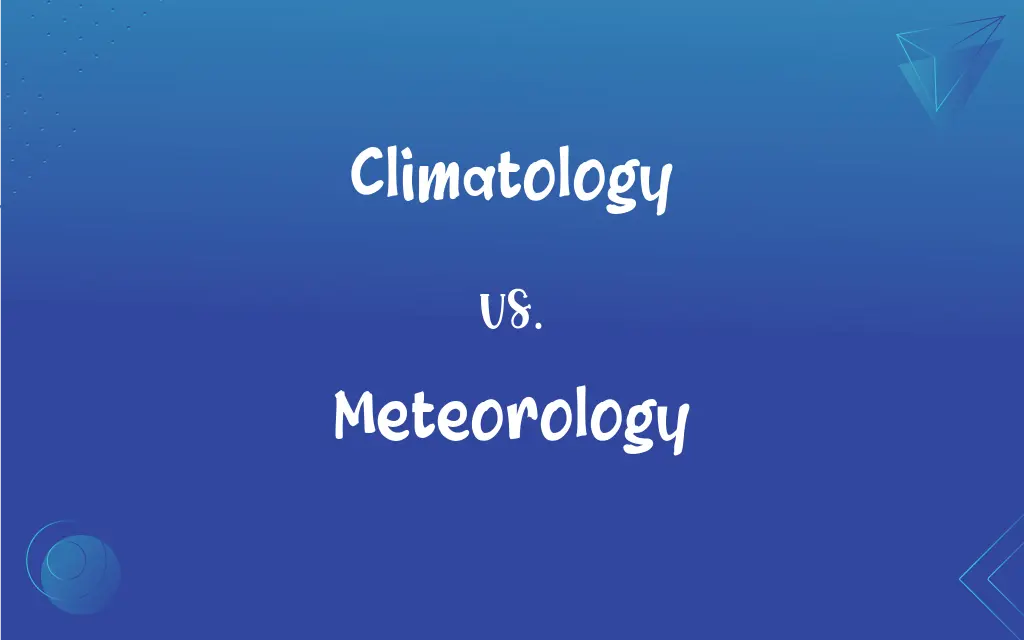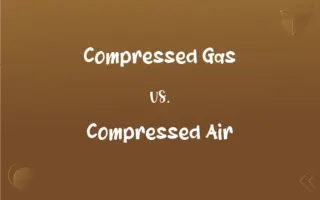Climatology vs. Meteorology: What's the Difference?
Edited by Harlon Moss || By Janet White || Published on December 14, 2023
Climatology studies long-term weather patterns and trends, whereas meteorology focuses on short-term weather forecasting and atmospheric processes.

Key Differences
Climatology is the scientific study of climate, which includes the analysis of long-term weather patterns and trends over time. It often involves the study of historical weather data to understand climatic changes. Meteorology, in contrast, is the science of the atmosphere that focuses on short-term weather forecasting and the study of atmospheric conditions that cause weather phenomena.
In climatology, researchers might examine data over decades or centuries to identify climate trends and variations. This field is crucial for understanding global warming and climate change. Meteorology, however, deals with the day-to-day atmospheric conditions and is concerned with predicting weather over short periods, such as days or weeks.
Climatologists often use models and historical data to predict future climatic changes and understand their impacts on the environment and human activities. Meteorologists use different tools like radar, satellites, and computer models to forecast weather and to understand atmospheric phenomena such as hurricanes, tornadoes, and rainfalls.
The study of climatology is essential for planning in agriculture, urban development, and disaster management in the context of long-term climate patterns. Meteorology, on the other hand, is critical for immediate weather forecasting, which is important for aviation, shipping, and daily life activities.
Climatology contributes to our understanding of earth’s climate system, including the role of oceans and biosphere in climate change. Meteorology, conversely, involves studying the dynamics of the troposphere, the lowest layer of the earth's atmosphere, and understanding how it affects weather and climate on a shorter scale.
ADVERTISEMENT
Comparison Chart
Focus Duration
Long-term (years, decades, centuries)
Short-term (days, weeks)
Primary Concern
Climate patterns and trends
Daily weather and atmospheric processes
Data Utilized
Historical data, climate models
Radar, satellites, atmospheric models
Application
Long-term planning, climate change study
Weather forecasting, atmospheric research
Study Scope
Global and regional climate systems
Atmospheric phenomena, local weather conditions
ADVERTISEMENT
Climatology and Meteorology Definitions
Climatology
Climatology is the study of climate, analyzing long-term weather patterns.
Climatology helps us understand the impact of human activities on global warming.
Meteorology
Meteorology is the science of the atmosphere, focusing on weather forecasting.
Meteorology helps predict severe weather events, aiding in disaster preparedness.
Climatology
Climatology involves examining historical weather data to assess climate change.
Through climatology, scientists identified the trend of rising global temperatures.
Meteorology
Meteorology studies atmospheric phenomena like storms and climate effects.
Meteorology played a key role in understanding the formation of hurricanes.
Climatology
Climatology aids in understanding the interaction between earth's systems and climate.
Climatology research contributes to our knowledge of the Earth's carbon cycle.
Meteorology
Meteorology involves the use of tools like radar for short-term weather prediction.
Advanced meteorology techniques improve the accuracy of daily weather forecasts.
Climatology
Climatology uses statistical analysis to understand and predict climate trends.
Climatology forecasts indicated a likelihood of increased droughts in the region.
Meteorology
Meteorology is crucial for aviation safety, providing necessary weather information.
Meteorology forecasts are essential for pilots to navigate safely.
Climatology
Climatology explores the effects of climatic variations on the environment.
Climatology studies showed how changing rainfall patterns affect ecosystems.
Meteorology
Meteorology examines atmospheric conditions to understand weather processes.
Meteorology research unraveled the causes of unusual temperature fluctuations.
Climatology
The meteorological study of climates and their phenomena.
Meteorology
The science that deals with the phenomena of the atmosphere, especially weather and weather conditions.
Climatology
The science that deals with climates, and investigates their phenomena and causes.
Meteorology
The science that deals with the study of the atmosphere and its phenomena, especially with weather and weather forecasting.
Climatology
The science which treats of climates and investigates their phenomena and causes.
Meteorology
The atmospheric phenomena in a specific region or period.
Climatology
Meteorology of climates and their phenomena
Meteorology
The science which treats of the atmosphere and its phenomena, particularly of its variations of heat and moisture, of its winds, storms, etc.
Meteorology
Predicting what the weather will be
Meteorology
The earth science dealing with phenomena of the atmosphere (especially weather)
FAQs
How does climatology differ from meteorology?
Climatology studies long-term climate trends, while meteorology focuses on short-term weather phenomena.
What is climatology?
It's the study of climate, focusing on long-term weather patterns and trends.
Do climatologists predict weather?
They predict long-term climate trends rather than daily weather conditions.
Can climatology help in agriculture planning?
Yes, by providing long-term climate information for crop planning.
Are meteorologists involved in climate change research?
Yes, they study atmospheric conditions that can impact climate change.
What tools do meteorologists use for forecasting?
They utilize radar, satellites, and atmospheric models.
What is meteorology?
Meteorology is the science of weather, concentrating on short-term forecasting and atmospheric studies.
What tools do climatologists use?
They use historical data, climate models, and statistical analysis.
Can climatology predict future climate scenarios?
Yes, using models based on current trends and historical data.
Is meteorology only about weather prediction?
It also involves studying atmospheric processes and climate effects.
What is the significance of meteorology in agriculture?
It offers weather forecasts crucial for planting and harvesting.
Does climatology study oceanic patterns?
Yes, as they significantly impact global and regional climate.
How accurate are meteorological forecasts?
They have become increasingly accurate with advancements in technology.
Is meteorology important for aviation?
Yes, it provides crucial weather information for flight safety.
Do climatologists study global warming?
Yes, they analyze long-term data to understand global warming trends.
How do meteorologists predict storms?
They use atmospheric data and models to track and predict storm paths.
Can meteorology aid in disaster management?
Yes, by providing accurate weather forecasts for emergency preparedness.
What's the importance of climatology in climate change mitigation?
It provides essential data for developing strategies to combat climate change.
What role does climatology play in urban planning?
It helps in designing cities considering long-term climate changes.
How does climatology impact environmental policy?
It provides scientific data for policies on climate change and sustainability.
About Author
Written by
Janet WhiteJanet White has been an esteemed writer and blogger for Difference Wiki. Holding a Master's degree in Science and Medical Journalism from the prestigious Boston University, she has consistently demonstrated her expertise and passion for her field. When she's not immersed in her work, Janet relishes her time exercising, delving into a good book, and cherishing moments with friends and family.
Edited by
Harlon MossHarlon is a seasoned quality moderator and accomplished content writer for Difference Wiki. An alumnus of the prestigious University of California, he earned his degree in Computer Science. Leveraging his academic background, Harlon brings a meticulous and informed perspective to his work, ensuring content accuracy and excellence.







































































